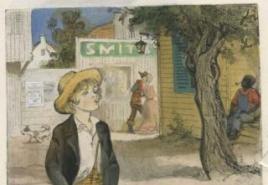Analysis of the poem "Motherland" Tsvetaeva. Marina Tsvetaeva "Rodina": Analysis of the poem of Poems Tsvetaeva about Motherland
The poem is written after the October Revolution, in emigration, where the poetess left Russia, followed by his husband. But forced emigration did not bring the color desired relief: longing the longing in Russia forever tied it from his homeland, which is why, who lived for many years abroad, afterwards she still decided to return to Russia. The relationships of the poeses with their own country were not just seen, but the topic of the Motherland is one of the main in the Poetry of Tsvetaeva. Lyrical heroine is alone. Devil from Russia, Emigrant Traggare
There are existences in poetry to the confrontation of the lyrical Russian "I" of the heroine to the whole non-Russian, alien.
Loss of the Motherland for M. Tsvetaeva had a tragic value: it becomes a rougom, lonely, loose man. It is in the emigration that the topic of the Motherland begins to sound in a new way: there is a feeling of loss of the house, the motive of orphanhood. In the poem "Motherland", the lyrical heroine dreams of returning home and the central idea opposes the oppression of a foreign land, Dali and at home: Dal, who distinguished me, Dal, saying: "Return home!" From all - to the Alpine Stars - I am shooting me! All poem
Built on the antithesis, the contrast of "Russia, My Motherland" and Dali - "Thiege Earth".
Marina Tsvetaeva is typical of the personal perception of the world, the poetic "I" is inseparable from the image of the lyrical hero. This is confirmed by numerous personal pronouns used in the text of the poem: "Before me", "My Motherland", "I'm deleted by my foreheads", "Pattle of MY".
Personal perception of poetess is highlighted on the fore, so artistic images are intertwined: Dal is a three-way earth! Alien, my homeland! On this page you were looking for: Marina Tsvetaeva Rodina Analysis A brief analysis of the poem of the Tsvetaeva Motherina Marina Tsvetaeva Analysis of the poem of the Motherland Analysis of the poem of the Tsvetvaeee Motherland according to the Motherland plan
Works on topics:
- The poem "Motherland" was written by K. Simonov in 1941, during the Great Patriotic War. The main topic is the topic of the Motherland ....
- The poem "Dawn on the Rails" was written in 1922. Tsvetaeva did not accept and did not understand the October Revolution, and in May ...
- Many poets concerned in their work of patriotic topics. Mikhail Yuryevich Lermontov in this sense was no exception. His poem "Motherland" ...
- "Machine" (1931). In this poem, Tsvetaeva reflects on the ratio of secrecy and poetic creativity. Indospects, Divine Authority is A. S. Pushkin ....
Conducted abroad 17 years (1922-1939) could not but cause feelings of longing in their homeland in such an injury and fine nature as Marina Tsvetaeva. In 1932, in May, the poetess writes the poem "Motherland", the analysis of which I suggest.
I will start from afar - poems are written in May and later the poetess had to be glad and kneaded to the coffin board, when she, brought to the "homeland", would commit suicide. Of course, this is a comparison and no more, the month of May is not guilty - this is the fate of Tsvetaeva, such were the morals of the powerholders who do not want to give a word to a free voice.
The poem made their fatal contribution to the fate of poetess. It was it that it was estimated upon receipt of permission to return to the USSR. The harsh examiners did not find anything inadequate in it and allowed the Tsvetaee back to their native land. They "let out" into the union of the one who picked up Russian land, and there he brought him to suicide - is it not cynicism?
Most critics argue that the poem "Motherland" sample of patriotic poetry - I do not agree. There are a song of Russian Earth in verses, and not the country in which the poetess is coming back and where it is waiting for rejection, oblivion and death. Other craftsmen disassemble strokes on the bones say that the poems were written specifically under return - their goal "Damux" Soviet power. Nonsense - in 1932, Tsvetaeva and did not think about returning.
These disagreements with a number of generally accepted estimates do not take away the value of the work. A complex four-stroke yum allows you to distract from the attractiveness of the rhyme and focus on the internal filling of the poem.
Dahl, under which Russia is meant, manitis and calling the poetess, but only the Russian land remained, everything else has changed.
Symbolic Last Quarterly:
You! His hands are listed, -
Although two! Lips subscribe
On the plate: the diverse of my land -
Pride, my homeland!
The appeal to "you" is personally, which emphasizes the mental impulse, but at the same time Tsvetaeva calls the Motherland pride, although the lines can be interpreted as an appeal to his pride, which interferes return. Anyway, but the Motherland met her husband with a color plate, a katoroga daughter and poverty, which brought to the loop, the poetess itself.
Oh, uncorrect language!
What would simply be a man
Understand, singer to me:
"Russia, my homeland!"
But from the Kaluga Hill
She opened it -
Dahl, threatened land!
Alien, my homeland!
Dahl, inborn like pain
So homeland and so -
Rock, which is everywhere through all
Dahl - I carry all her with him!
Dahl, who distinguish me blizzards,
Dal, saying: "Return
Home!" From all - to the Alpine Stars -
I take off the places!
No wonder, water pigeons,
I discard my foreheads.
You! His hands are listed, -
Although two! Lips subscribe
On the plate: the diverse of my land -
Pride, my homeland!
Who, what does the poet devoted to their creations? Beloved or beloved, friends, parents, childhood and adolescence, events from the past, teachers, universe ... and it is difficult to find a poet who would have completely bypassed their homeland. Love and hatred for her, experiences, meditation, observations are reflected in poems. The theme of the Motherland is developed and let's look at its originality in poetess of the Silver Century poetess.
Leitmotif
Marina Tsvetaeva, which spent a considerable part of his life in emigration, is rightfully considered to be a Russian poetess. And this is not good. Many researchers confirm that the creativity of this evidence of terrible fractures of Russian history is the chronicle not only the love, but also the birthplace of the beginning of the 20th century.
We absolutely can say that Marina Tsvetaeva loves Russia. She misses all the disturbing, ambiguous events, analyzes them in their work, trying to work out a clear attitude towards them. Including in-depth and in the long history ("Razin").
Alive in her work and the theme of the White Guard. Marina Ivanovna did not accept the revolution, her terrified civil war.
Russia
Arguing about the theme of the Motherland in the work of Tsvetaeva, we note that in its works a lot of women's start. For her, Russia is a woman, proud and strong. But always the victim. Samely Tsvetaeva, even in emigration, always part of the Great country, was her singer.

Biographers admire independence, strong and proud gloom of Marina Tsvetaeva. And her durability and courage were embarrassed in hot and misunderstanding love. Therefore, the topic of the Motherland in Poetry Tsvetaeva is rightfully considered one of the leading.
Surprisingly, what are the emotionally strong works about the homeland at the poets! Nostalgic, tragic, hopeless and to pain dreary. But, for example, "poems about the Czech Republic" is her recognition in love for Russia, her people.
Childhood
The brightest, joyful notes in the poetics of Tsvetaeva about their homeland appear when she writes about her childhood spent in Tarusa on the Oka. The poetess with gentle sadness returns there in his work - to Russia of the last century, which is no longer returned.

Here, Tsvetaevskaya Russia is infinite space, the amazing beauty of nature, a sense of security, freedom, flight. Holy land with a courageous and strong people.
Emigration
It must be said that the cause of the emigration of the color was not its ideological considerations. The departure was the circumstances - it followed the husband, a white officer. From the biography of poetess, it is known that 14 years she lived in Paris. But the glittering city of the dreams did not captivate her hearts - and in the emigration of alive the theme of the Motherland in the work of Tsvetaeva: "I am alone here ... and in the heart cries the verse of Rostan, as there, in the abandoned Moscow."

At the age of 17, she wrote the first poem about Paris. Bright and joyful, he seemed to her dreary, big and depraved. "In a large and joyful Paris, I will shoot herbs, clouds ..."
Store the image of the dear homeland in the heart, she always secretly hoped for his return. Tsvetaeva never taled resentment to Russia, where her work, truly Russian poets, was not accepted, unknown. If we analyze all its works in emigration, we will see that the depreciation is a rocky and inevitable painful pain, but the one with which she was coming.
Return. Moscow
In 1939, Tsvetaeva returns to Stalin's Moscow. As she writes herself, she moved her desire to give his son to his homeland. I must say that she from birth tried to instill in George love for Russia, give him a part of this his strong light feeling. Marina Ivanovna was sure that the Russian man could not be happy away from their homeland, so she wanted her son to love and accepted such an ambiguous depreciation. But is she glad to return?
The theme of the Motherland in the works of the color of this period is the most acute. Returning to Moscow, she did not return to Russia. On the courtyard of someone else's Stalin era with denunciations, encircling shutters, universal fear and suspicions. Marina Tsvetaeva Tryazhko, stuffy in Moscow. In creativity, she seeks to escape from here into a bright past. But at the same time the poetess exceeds the spirit of his people, who passed through terrible tests and did not break. And she feels part of him.
Tsvetaeva loves the capital of the past: "Moscow! What a huge stirring house!" Here she sees the city with the heart of the Great Power, the repository of its spiritual values. She believes that Moscow spiritually cleanse any wanderer and sinner. "Where and the dead I will be joyful," says Tsvetaeva about the capital. Moscow causes her sacred trepid into his heart, for the poets it is the ever-a young city that she loves as a native sister, a faithful girlfriend.

But it can be said that it was the return to Moscow ruined Marina Tsvetaeva. She could not accept reality, the disappoints immersed it into severe depression. And then - deep loneliness, incomprehensibility. Having lived two years at home after the long-awaited return, she voluntarily left his life. "I did not carry out" - as the poetess itself wrote in a suicide note.
Poems Tsvetaeva About Motherland
Let's see what our glorious works M. Tsvetaeva dedicated to Russia:
- "Motherland".
- "Wallpoint".
- "People".
- "Wires".
- "Homesickness".
- "The country".
- "Swan Stan".
- "Don".
- "Poems about the Czech Republic."
- Cycle "Poems about Moscow" and so on.
Analysis of the poem
We take a look at the development of the topic of Russia in one of the significant poems of Marina Tsvetaeva "longing in the homeland". After reading the work, we immediately define that this is the argument of a person who turned away from the beloved country. Indeed, the poem was written by Marina Ivanovna in emigration.
The lyric heroine of the work with amazing accuracy copies the poechess itself. She tries to convince himself that when a person is bad, there is no difference where he lives. Unhappy anywhere will not find happiness.
Once again, rereading the poem, we will notice the Gamletovsky question in paraphrase "to be or not to be?" At the color of his interpretation. When a person lives, there is a difference where it is, and when there is, suffering, - no.
"... absolutely anyway -
Where completely lonely
She argues with bitterness that all the feelings in her soul burned out, it remains only to humbly carry his cross. After all, no matter where there was a man away from homeland, he will be in a cold and endless desert. Scary key phrases: "I don't care," I am indifferent. "
The heroine is trying to assure himself, which is indifferent to the place where her soul was born. But at the same time says that her real house is a barracks. Tsvetaeva affects the theme of loneliness: she cannot find themselves among people or on the lap of nature.

In conclusion, she argues with bitterness that she did not have anything left. In emigration, everything is alien to her. But still:
"... if on the road - bush
Rises, especially Rowan ... "
The poem is broken on dots. After all, the tasty longing for the debris is impossible to express until the end.
The topic of the motherland in the work of Tsvetaeva is tragic. She chips away from her, but also hard in the modern Russia. Light sadness, touching notes are traced in her poems, only when poetess recalls his childhood, about the past Russia, Moscow, which is no longer returning.
Many of the poetic works of Marina Tsvetaeva are devoted to the topic of the Motherland, although she spent most of his life outside of Russia (studies in French University, emigration, life in Prague, then in Paris). Piercing and lyrical poem "Motherland" written by Tsvetaeva in 1932 in the suburb of Paris, where she lived with her husband and two children, became one of the bright pearls in her creative heritage. The main theme of this work is the feeling of tuskygiy poetess in her native land and desperate desire to return home from a foreign land.
Tsvetaeva, which grew up in the family of Moscow intellectuals (Father famous professor-philologist Moscow University, Mother - Pianist, student of the famous pianist-virtuoso and conductor Nikolai Rubinstein), with great distrust and horror perceived the ideas of a new revolutionary power, wrapped with blood and terror for the whole Russian people . The post-revolutionary Russia ceases to exist as a homeland for Tsvetaeva in its old and habitual understanding, and she, with difficulty having achieved departure permission, leaves for emigration, first in Prague, then to Paris. After having ceased to be afraid of his life, having received some stability and livelihood, Tsvetaeva unbearably longing in his homeland and contrary to a healthy meaning, the stories about what is happening in Russia (red terror, arrests and executions of former White Guards and them sympathizing, hunger and poverty), She seeks to return home and applies all its efforts for this.
Main theme
In 1932, the poem of "Motherland" was written in 1932 the thought of poetess about the relationship of each person with his people and his native land, on which he was born and grew. Already the first lines of the work focus the attention of readers on the fact that the lyrical heroine of Tsvetaeva is the same as a simple Russian man, they have a lot in common, together they are part of the great and mighty Russian people, which she is immensely glad and proud by this fact.
Tsvetaeva describes his feelings to his homeland and says that she is taking home on the call of his heart, which is stronger than the voice of her mind. Wherever she was, what a fate would not bring it, love for his native land always returns her back: "Dahl, saying:" Return home! " From all - to the Alpine Stars - I am shooting me! ". The poetess until the last moment of his life is ready to praise his depression and is proud that she is her daughter, ready to take it in any kind and share with her any fate prepared over: "You! His hands are listed, - at least two! Lips subscribe to the feet. "
The poetess describes the torment and torment of the lyrical heroine, suffering from thought, how far is it from their native places, and what huge obstacles stand on her way to them. The last lines of the work presented in the form of a dialogue poetess and her debris show the whole depth and sincerity of her feelings. One short, but very eloquent and appeal to Russia "You!", And then "Gordinia, My Motherland!" How it is impossible to reveal a simple, but at the same time a deep feeling of love and respect the color to your distant homeland.
Composite construction, artistic techniques
The poem "Motherland", which is a bright pattern of patriotic lyrics of Tsvetaeva, has six stanza, the first five are rings or quatrains, the last sixth - two-line distortion. It is written by a four-stranded yack using related reflection and explicit emphasis on the men's rhyme (emphasis on the last syllable). A variety of measures and techniques of artistic expressiveness are used: epithets, antithesis, rhetorical appeals. The inconsistency of the feelings of the heroine to the Motherland is transferred to the Oxymologians "Alien, My Motherland", "Dal, who distinguish to me", repeatedly repetition of the word "Dal" (Reception of Lexemes), the fourth stanza pronounced AnaFor (uniquely) all the work.
The poem "Motherland" was of great importance in the further fate of the poetess when she and her family filed documents to the Embassy of the Soviet Union to return to Russia. It became an additional argument in accepting a positive decision on their petition, because the official came to the soul seen in this work sincere patriotism and loyal to power to the Bolsheviks. And this in the conditions of the formation of the young Soviet state was very important because it was so supported by the Renome of the Young Soviets as the state where the justice and equality triumph. Although in fact it was written not as a tribute to patriotism or loyalty to the new government, but as a tragic and sad poem, the memory of the past life, filled with sad memories and nostalgia.
However, the return of the poets and her family did not bring them any happiness in the future, neither calm: her husband Sergei Efron was shot, the daughter of Ariadne was arrested and sent to the link for 15 years, the son died in 19 years old on the front, Tsvetaeva herself tragically left life .
In 1932 (year of emigration) Marina Tsvetaeva wrote a poem "Motherland". In the period of writing a poetess tormented an insurmountable longing for native places. She does not give resting remoteness from Russian lands, fate leads the heroine in foreign land, where she gets new impressions. Parting from homeland for Tsvetaeva was very tragic. She began to feel outlaughter, lonely and loose man. In the poem, it is a lyrical hero, who is insanely dreaming of returning home, as a result of which it follows the main theme of the poem: opposition to a foreign and native home. I think it is impossible to say that the work is sad or joyful. It carries neutral mood. In order to convey all the experiences and feelings of Marina Tsvetaeva, such means of expressiveness as epithet, anaphora, antithesis, personification, rhetorical appeal, oxymoron. Rhyme poem-cross-stop. Size - four-memb. This poem poetess, in my opinion, is one of the best, it is very soulful, talking about many things.







